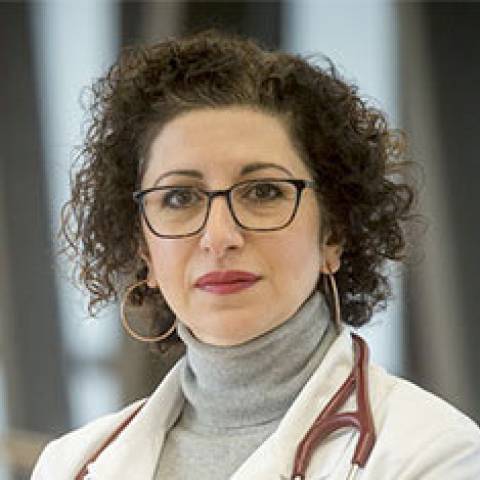
A three-pronged commitment to cardiovascular care
The key to good heart health is patient access
For Salpy V. Pamboukian, MD, that principle has underscored her career. It’s been a long-time goal — and hurdle — to ensure patients receive the quality cardiovascular care they need.
“Access really is the No. 1 challenge in getting patients in need to seek and receive care in a timely manner. There are socioeconomic, racial and gender inequities, and other barriers that come into play,” Pamboukian says. “Plus, in healthcare, we have limited space, limited beds, limited clinic availability. Access is always a problem, and it should be one of our highest priorities.”
Dr. Pamboukian recently joined the Heart Institute at the University of Washington Medical Center after serving as the medical director of the University of Alabama at Birmingham Mechanical Circulatory Support Program and co-section head of Advanced Heart Failure and Cardiac Transplantation. She has waged this battle for patient access for more than 20 years. Through clinical care, research and education, she plans to continue her efforts at UW Medicine.
Quality cardiovascular care for everyone
As a board-certified advanced heart failure and transplant cardiologist, Dr. Pamboukian has always been at the forefront of providing leading-edge cardiovascular clinical care.
“During my medical training, mechanical circulatory support and mechanical heart pumps were emerging, and it was exciting to be at the cusp of new development and technology,” she says. “I’ve also always enjoyed the journey of heart transplantation. By the time these patients come to you, they’ve seen many cardiologists and are out of treatment options. Seeing someone through transplantation and returning their quality of life and longevity is very inspiring.”
Her interest in the care of patients with mechanical support devices led her to assume a leadership role as co-chair of the International Society for Heart and Lung Transplantation’s writing group of the 2013 Guidelines for the Management of Patients with Mechanical Circulatory Support.
Her passion for delivering the best care to all patients also sparked her devotion to improving heart health in women. While at UAB, she started the Women’s Heart Health Program. Though the top mortality cause for American women, heart disease frequently goes unrecognized and untreated.
“Many women come to me with very real heart disease, and they have stories of how their doctor dismissed their symptoms and did not give them the type of assessment that is warranted,” she says. “Women’s symptoms are often attributed to stress, anxiety or something musculoskeletal. I’ve been inspired to focus on women’s heart health so these women don’t have to face a long journey to get the services they need.”
Advancing cardiovascular care through research
As a cardiologist, Dr. Pamboukian’s dedication extends beyond direct patient care. She has also contributed to several multicenter clinical trials, pushing the field of knowledge forward to improve outcomes.
“I’ve been involved in research looking at mechanical circulatory support as new devices have come out over the years,” she says. “I’ve collaborated with a lot of basic and translational science researchers to link observations from the laboratory with real-world clinical data in an effort to better understand mechanisms of disease and develop new therapeutic targets.”
For example, most recently, she and her colleagues from the SUSTAIN-IT study discovered that quality of life improves after a heart transplant and MCS, but decreases over time
for older patients after they receive mechanical circulatory support while waiting for a transplant. This finding can potentially help direct clinical decision-making, she says.
In addition, her research has revealed racial and socioeconomic disparities can worsen heart failure
and that early telehealth intervention can reduce pain in patients with heart failure.
As she settles into her practice at UW Medicine, Dr. Pamboukian looks forward to collaborating with colleagues on new investigations.
Training the next generation of cardiologists
Education is a big part of Dr. Pamboukian’s commitment to improving heart care. While at UAB, she served as a fellowship director. And she plans to continue mentoring the next generation of cardiologists at UW Medicine, she says.
“Not everyone is destined to work in an academic medical center. Some trainees will go out into the community,” she says. “It’s important to educate them so they’re aware of the most state-of-the-art treatments and develop relationships with community cardiologists. They need to understand how to get their patients access to the more specialized treatments available in academic medical centers.”
Sharing her knowledge with all students and residents is important, she says. But currently, only 10%-15% of practicing cardiologists and 18% of cardiology fellows are women. So, a need exists for experienced women role models who can guide and assist these trainees along their educational path.
Overall, Dr. Pamboukian says, joining UW Medicine’s Heart Institute is a natural fit to continue her work across all pillars of academic medicine.
“Clinical care is always my No. 1 priority,” she says. “But with the open, friendly and collaborative nature of my new colleagues here at UW Medicine, I’m looking forward to continuing my medical education and clinical research efforts in a multidisciplinary way.”
Written by Whitney Palmer